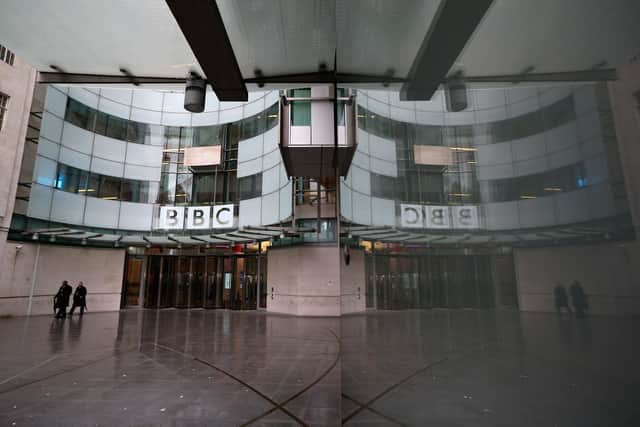Editors call on BBC to halt aggressive expansion into local news
Today editorial directors of local newspapers have joined forces in an unprecedented call to the BBC to rein in from its attempts to eat into the readership of long-established local titles.
In a message running across regional and local papers, the editors said that the BBC represents an “equally potent threat” to the sustainability of local journalism as tech platforms, fixated on stealing local media’s readers, businesses and the jobs of journalists.
Advertisement
Hide AdAdvertisement
Hide Ad“If the BBC was a family and lived in the house next door to you it would be the neighbour from hell,” the editors said, adding that the attack on local news media would be a “shameful legacy” for BBC Director-General Tim Davie.


The editors added that the corporation is viewed within the industry as “little more than a state-funded juggernaut on course to suffocate independent journalism in every city, town and village in the UK.”
“The BBC seems to be on a mission to be the only show in town - having taken an axe to its much- loved local radio stations so it can start writing news stories online which you can already get from local newspapers which are currently battling with tech platforms like Google, Meta and Apple,” they added.
The message is signed by senior leaders including those at Newsquest and National World, and it is thought to be the first time editorial chiefs from local publishers have co-signed a joint message in this way.
Advertisement
Hide AdAdvertisement
Hide AdThe editors said: “Unlike Google, Meta and co, the BBC’s funding is guaranteed by the licence fee, meaning the British public is underwriting the biggest threat local journalism has ever faced. It is splashing your cash on local news websites and making it increasingly difficult for proud, independent news sites to survive in the long term.”
The creation of 130 additional posts in local online news puts at risk thousands of existing jobs at titles known to their communities “for generations”, they added.
“It either knows what it is doing, and doesn’t care, or is ignorant to the impact it will have.”
They called on the BBC to abandon its roll out of 34 local websites.
Advertisement
Hide AdAdvertisement
Hide AdA BBC spokesperson said: “We are reshaping our local services to increase the value we deliver to audiences across England and to ensure we keep pace with changing audience expectations and remain a cornerstone of local life for generations to come. There is no evidence that the BBC is crowding out other digital publishers. We work collaboratively across the industry and our partnership with the NMA has transformed coverage of local democracy across the UK.”
It comes as the Culture Secretary, Lucy Frazer, denied that the Government is “ripping up” a licence fee deal with the BBC, following reports that Rishi Sunak is set to block a nine per cent hike in the annual charge.
For the past two years the licence fee has been frozen at the price of £159 but it was previously agreed it would rise in line with inflation after April 2024.
The corporation is seeking to make £500m of savings in the face of high inflation and the two-year freeze on the fee, which provides most of its funding.
Advertisement
Hide AdAdvertisement
Hide AdA BBC spokesperson said: “The Government and BBC agreed a six-year licence fee settlement in January 2022, which froze the licence fee for two years with increases in line with inflation from 2024.
“As is usual practice the Government sets and confirms the cost of a licence each year and this remains unconfirmed for 2024/25.”